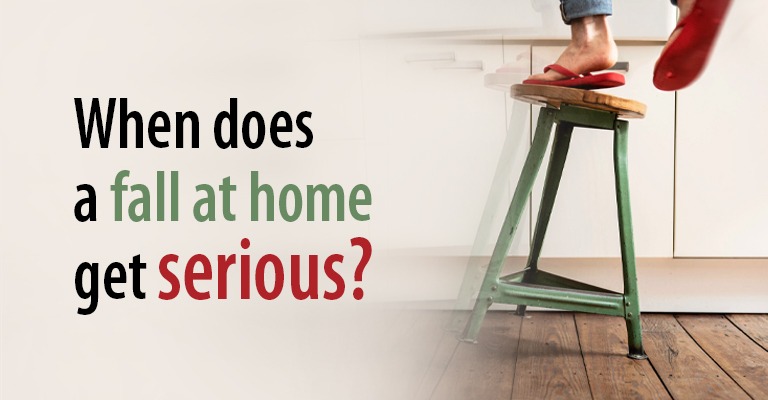Having a fall is quite a common occurrence among the elderly population, with generally 1 in 3 in the 65-plus population and 50% of those over 80 experiencing at least one fall annually. While most falls don’t result in serious injuries, the risk of broken bones in the wrist, arm, ankles, besides hip fractures, or worse, a head injury, always remains. It can also cause a severe dent in the person’s self-confidence and a sense of losing his/her independence.
What are the risk factors for a fall one can heed and minimize?
Most falls result from a combination of risk factors which include:
# Weakness of the lower body
# Vitamin D deficiency
# Difficulty walking and with balance
# Certain medications like sedatives or antidepressants
# Problems with eyesight
# Pain in the foot or using poor quality footwear
# Domestic hazards for slipping like uneven steps, a wet floor, dim lighting or throw rugs
What are the more serious consequences of a home fall?
# 1 out of 5 falls results in serious and debilitating bone injuries.
# Falls can lead to serious head injuries, particularly if the person is on certain medications like blood thinners. In fact, falls are the most common cause of traumatic brain injuries (TBI).
# Over 95% hip fractures are caused by falling, usually sideways.
# Sometimes the physical injury from a fall may not be serious, but it leaves the person fearful of routine daily activities, which in turn can make him/her weaker and more susceptible to falls.
What are the routine checks that should be carried out after a fall?
# Look for an underlying health condition: The checks should look for UTI, dehydration, anemia, pneumonia, a cardiac condition, strokes, including mild ones.
# Monitoring BP and pulse rate: Reading of the blood pressure and pulse is particularly significant if the fall is linked to lightheadedness or fainting.
# Blood tests: Doctors would usually go for a CBC or a complete blood cell count and check electrolytes levels, kidney function parameters and blood glucose levels. Falls are often triggered by too high or too low blood sodium or too low glucose levels.
# Review of medications: Doctors also check if the person is on medications like sedatives, tranquilizers or antidepressants, pain medication, BP and/or diabetes medication, etc which can spike the risk of falls.
# Check gait and balance: A gait assessment or watching minutely how the person walks. If gait and balance don’t seem OK, the doctor will either address the pain or discomfort impeding him/her or advise physical therapy.
# Check Vitamin D level: Research shows treating low vitamin D levels can help reduce fall risk in older adults. Weak and fragile bones are also caused by vitamin D deficiency.
# Screening for underlying heart or nerve conditions: Doctors often look for conditions like paroxysmal rapid atrial fibrillation, which can lead to a racing heart or a chronic neuro issue like Parkinson’s disease.
# Check vision: If the elderly fall patient hasn’t had an eye workup in a long time, it’s surely time for a comprehensive evaluation of eyesight.
What can I do to avert falls at home?
Here are some useful tips:
# Mop up spillages promptly
# De-clutter your home by removing loose rugs or wires
# Use anti-slip mats and rugs
# Ensure adequate lighting in all rooms, staircases and passages
# Keep furniture organized to minimize risk of bumping into stuff
# Seek help to fetch things that are out of your reach
# Don’t wear clothes that are too loose or are trailing so that you don’t trip
# Don’t walk on slippery floors, particularly with socks on
# Wear good quality and secure footwear that provides adequate ankle support
# Take good care of your feet. Visit a podiatrist if required
# Do strength-building and balance-training exercises regularly
# Avoid or limit your alcohol intake as it might raise your risk of a fall. Too much drinking can also contribute to osteoporosis
The broad takeaway is that elderly people who are frail and have pre-existing medical conditions stand a much lesser chance of recovering from fall-related injuries. Hence, it’s wise to be watchful and try and prevent a fall, particularly if you are 70 or more. Also remember, a fall can quickly turn serious, so keep out for signs of internal injuries like disorientation, sudden pain, temporary loss of consciousness or balance.
At Medica Siliguri, our Emergency department is geared 24×7 to deal with home accidents and trauma, with specialist on call round the clock.



